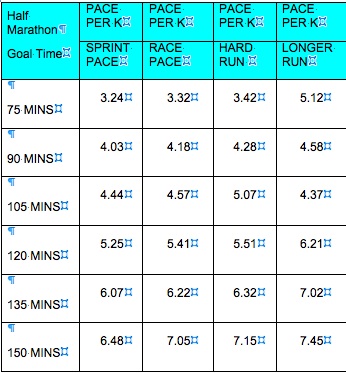Have you set yourself a goal of running your first half marathon?First of all – congratulations! The half marathon is a great event to take on! It is a challenging event, but something that is definitely achievable and rewarding if you put the work in and prepare yourself for the race. Getting started training for a half marathon can seem daunting – especially if it is your first race. But you will see that the training program for a half marathon consists of lots of smaller runs built up over time. Nothing beats just hitting the pavement – so get out there!
Here are some of our tips to help you prepare for your first race.
SET A GOAL
Getting started with your training, it is a good idea to set some goals for what you want to get out of the race. If this is your first race, your goal might be to finish! And that is perfectly fine and the goal that most first timers have!
If you are a seasoned racer, your goal is probably closer linked to what time you want to finish in. Either way, setting goals will help you to stay on track and provide you with the motivation you need to persist with your training. It will also help you to work out what pace you need to be running at for each session.
If you have a goal finishing time for the race, use our pace chart below to help you work out a pace for each run you do.
STAYING MOTIVATED
Truly the best bit about training for a half marathon is the training! Enjoy the small victories along the way! It will go along way to helping you stay motivated.
Also, be conscious of the fact that sometimes you won’t feel good running. Some days will be a lot harder than others to drag yourself out the door and hit the pavement. You might hear a lot of runners say, there is no such thing as a bad run – and it’s true! Enjoy the training, even the crappy sessions – as they are helping to make you a stronger and faster runner!
CROSS TRAINING
Strength is an extremely important part of becoming a better and of course, stronger, runner. Strength training will help you to prevent injuries and reduce imbalances in your body.
Runners often avoid strength training as they think that it will make them bulk up and slow down. A lot of runners also think that strength training is wasted on them – nothing will get them fitter or stronger than hitting out lots of kilometres on the pavement. Neither of these things are true! Adding regular strength training to your program will not only help you to become a faster and stronger runner, but will also help you to avoid injury.
Check out our article on strength training for runners here.
Going the distance!
Two bits of good news! Firstly, you don’t have to start out running huge distances each week. Your longest run of the week only needs to be around 8 – 10K for your first week of training (which should be around 12 weeks out from your race).
The second piece of good news is, you don’t have to run massive distances all week. Aim to include one long run in your program, and then an additional 2 – 3 shorter, faster paced runs during the week.
Interval training and hill training will help you to become a much stronger and faster runner.
Check out our sample training program here.
REST DAYS
What are rest days? They are days when you allow your body time to recover and strengthen. There is one key thing you need to do on your rest day……….REST!! No training whatsoever, mentally and physically this is really important. You will build more strength and fitness if you allow yourself breaks, rather than trying to flog yourself every day.
MISSED TRAINING!
If you miss a session, or even a week of training – don’t stress and definitely don’t give up! Sometimes a missed week of training can actually do wonders for you. You might find it has reignited your motivation and given your body a well deserved rest. Two main points about missing training. Try to get back on track as soon as possible, the week you resume running, scale back speedwork and long run mileage by 10 per cent. The following week, do your normal training. If your break was because of injury, however, you need to reduce your weekly mileage for up to three weeks before getting back on track, and may need to target a later race.
Most of all! Enjoy the journey!
Happy running!



